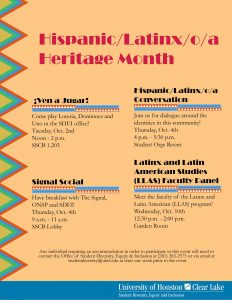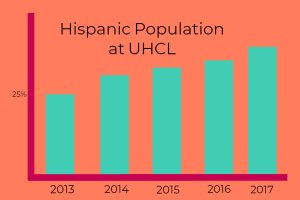Hispanic/Latinx conversation reveals struggles with identity and discrimination
The Office of Student Diversity, Equity and Inclusion hosted a Latinx conversation Oct. 4 in the student orgs room. The event was one of many hosted for Hispanic Heritage Month, which lasts from Sept. 15 to Oct. 15.
Officially titled and marketed as the “Hispanic/Latinx/o/a Conversation,” the event was a discussion meant to provide meaningful dialogue about identity in the Hispanic and Latinx community, specifically focusing on discussing and clearing up the definitions and meanings of various identity terms in the community.

Questions discussed at the event included: the origins of the terms Hispanic, Latino/a, Latinx, Chicano/a and Chicanx; living in America and identifying as one of these terms; and the merits of Hispanic Heritage Month.
Moderator Christina Cedillo, assistant professor of writing, got emotional early into the conversation as she recounted what it was like growing up Latino. Other participants, like Latinx & Latin American Studies representative Erica Solis and Joshua Quinn, also shared their experiences growing up Hispanic and addressing the cultural and societal issues of being of Hispanic, or Latinx.
“Latinxs are the fastest growing minority population in the United States, and although we’ve made great strides in terms of recognition and acceptance of our cultures in recent decades, we still lag behind other groups when it comes to graduations rates, presence in academic fields or leadership positions, or earning potential,” Cedillo said. “As was noted in the discussion, our foods and customs are now a big part of the dominant culture, but we still face a lot of discrimination, racism and ethnicism.”
The event revealed some insights into the word “Latinx,” including how the label is not only a way of being gender neutral, but is also meant to be a callback to the indigenous people of the Americas and how, during their time, they believed in more than just two genders, a belief that was suppressed after being deemed savage by colonialists.
The event generated an array of other topics relating to the Latinx community, even tying the struggles of the Latinx community to those of the African-American community, as well as those who are Black and considered Latino or Hispanic.
“For Black and Indigenous Latinxs, colorism even within our own communities is a big problem,” Cedillo said. “These issues have to be openly acknowledged and discussed rather than ignored due to a general cultural adherence to not addressing ‘controversial topics.’ ‘Controversial’ is too often a word that disguises people’s refusal or reluctance to discuss problematic issues that inform our everyday lives.”
Solis expressed absolute satisfaction with how the conversation turned out, giving particular praise to Cedillo’s hosting of the event.
“Dr. Cedillo did a fantastic job with not only providing us with additional resources to continue our own research, but she really kept it real and personal,” Solis said. “She not only facilitated the discussion but connected with us and made it very personable.”
Solis admitted that despite being happy with the discussion and Cedillo’s moderating of it, she was disappointed in the amount of attendance at the event, which was about ten attendees.
“I was really expecting to see more of the Hispanic/Latina/o student population show up, as well as other populations on campus joining in on this conversation,” Solis said. “I was really ready to have this great big in-depth conversation with students from other races and/ or ethnicity here at UHCL, along with faculty. Maybe this is why we [need] to continue to have these and have them more often.”
Solis’ were not the only mixed feelings held that day, as the discussion soon revealed the mixed feelings of those who identify as Hispanic and Latinx have regarding Hispanic Heritage Month.
“I admit I’m skeptical of dedicating a month to one group or other if it is not accompanied by a real drive to learn about and communicate with each other at all times,” Cedillo said. “I’d also say that I celebrate Latinx Heritage every day because it means we are still here, despite centuries of colonization and the forced assimilation of past decades. However, it is also a very useful way to welcome non-Latinxs to learn about our many different communities and to remind one another that we are all human, that we are all different, and that that’s okay.”
Cedillo went on to say that such differences are “better than okay,” but actually “wonderful.”
“Our country is unique in that we don’t have to be all the same, and that is a gift because it allows us to share and learn from one another; life is never boring,” Cedillo said. “So if it takes getting a month for folks to be open to coming together, I’ll gladly take it.”
Overall, the event was one that left Cedillo and Solis happy with the discussions among the students and staff.
“I think the conversation went well, especially for a Thursday afternoon,” Cedillo said. “And, I’d like to thank everyone for coming and listening and talking and sharing space in which we could share our thoughts about some very difficult issues that affect our communities.”
Cedillo also revealed she was grateful for those who “brought up the importance of being strategic and making room to engage in social change.”

“I am also heartened by discussions that highlight the need for people [especially students] from minoritized or marginalized communities to come together, to build coalitions that will allow us all to move forward together,” Cedillo said. “We are all affected by many of the same issues, though sometimes we don’t realize it because their effects may look very differently for different groups.”
Erica Solis expressed similar sentiments while also stating the discussion brought to light more that UHCL can do as a Hispanic Serving Institution (HSI).
“I firmly believe that if we call ourselves an HSI as a University then we need to deliver,” Solis said. “Deliver more classes, deliver more minors, deliver more Bayou Theater programs, artwork, festivals, guest speakers, etc. because then, and only then, does that stand by what we say we are! That is terribly lacking at this university. I believe administration knows it, and the students most definitely feel it and see it!”

